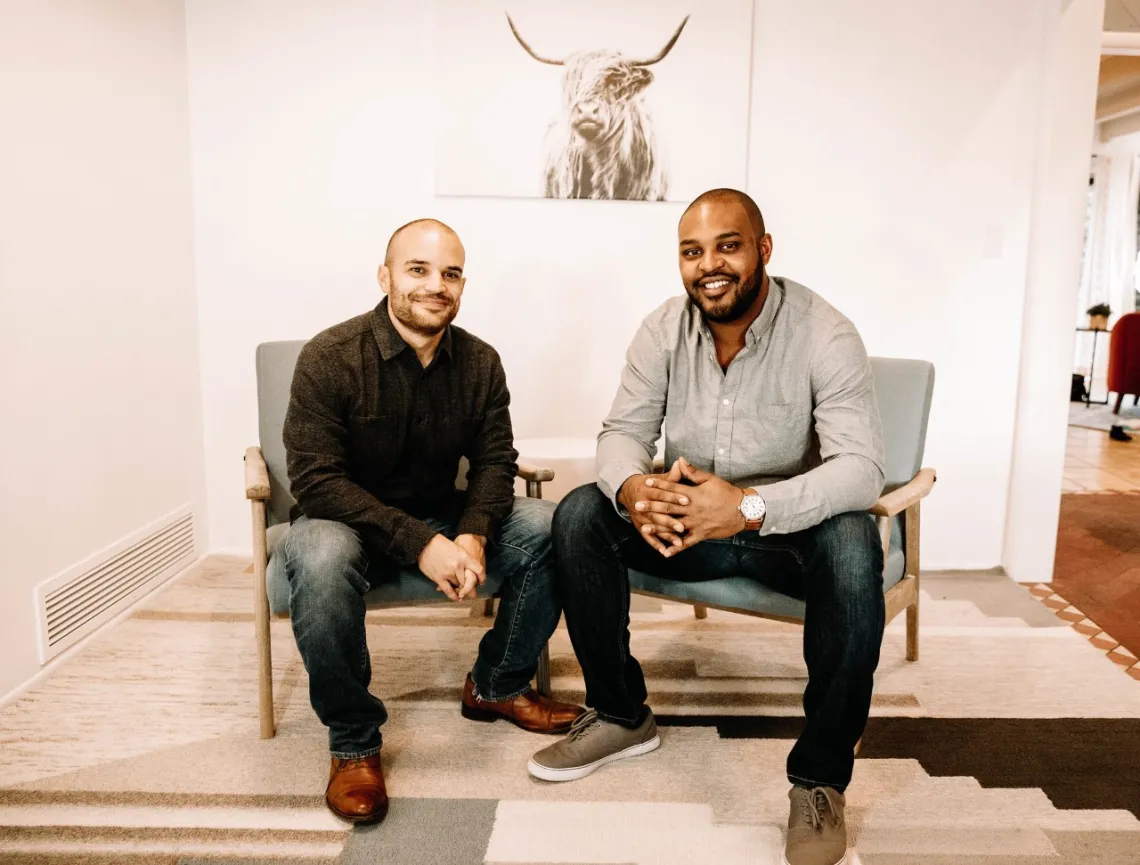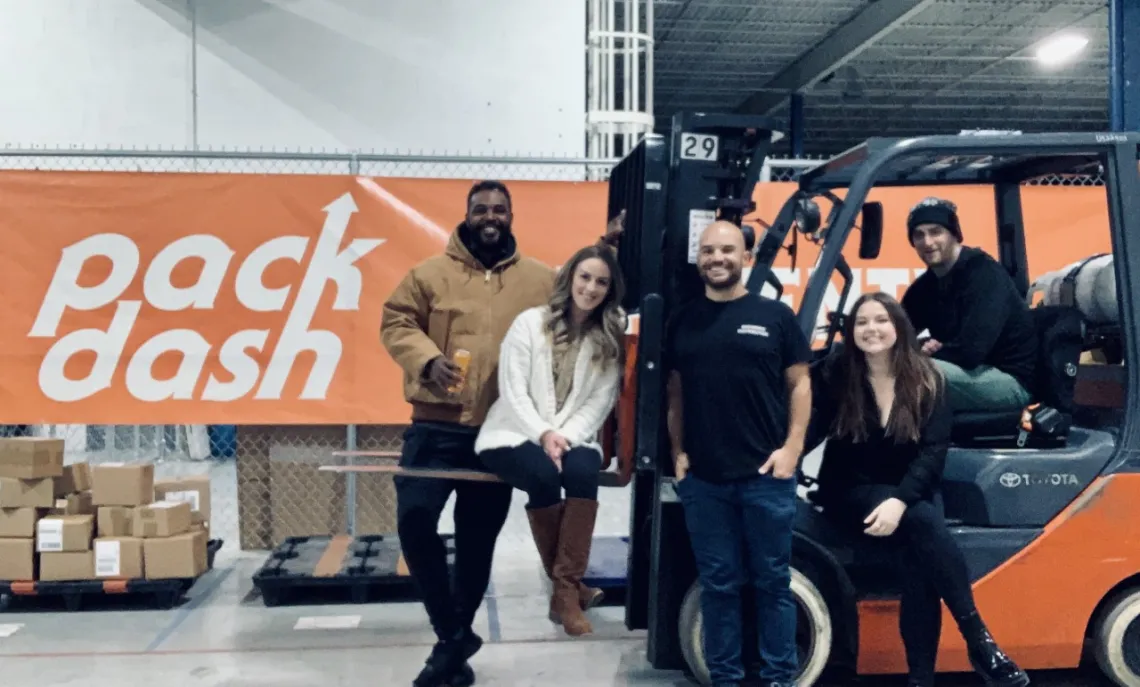FORGE Ahead Resident Startup PackDash awarded $100,000 by Google Startups Black Founders Fund
How Vulnerability Got PackDash in the Door at Google

PackDash Founders Dave DiCosola and Kameron Norwood
"Be vulnerable,” is Kameron Norwood’s advice to other startup entrepreneurs. That advice can be uncommon in the world of startups but it paid off for Norwood. One of the co-founders of FORGE Ahead resident PackDash, Norwood has been named one of 50 founders selected for the Google Startups Black Founders Fund. “We were awarded one hundred thousand dollars for our business,” said Norwood. “It's really exciting. On top of that it comes with Google credits and ad services, and it comes with some really cool, networking opportunities.” In the U.S., where less than one percent of venture capital goes to black founders, this kind of access to capital and support is critical.

Born and raised in Tucson, Norwood earned his degree from the University of Arizona. After graduating, he moved to Chicago to start his career and met his future business partner Dave DiCosola. When DiCosola married a Tucson native, it was the right time to expand business operations to Tucson.
Their company, PackDash, provides multi-channel fulfillment services to e-commerce brands, helping those brands grow and succeed with premium, personalized, and cost-efficient service.
“PackDash is a business created from a necessity we had with our first business, an e-commerce brand,” said Norwood. “It just became a paralyzing and terrible experience for us. We felt like we couldn't or didn't want to grow because of all the issues we had with fulfillment. If you sell consumer product goods, inventory, shipping, and logistics is a core piece of your business and it can make or break you.”
Sharing their fulfillment problems with their network led to opportunity. DiCosola and Norwood discovered most business owners they knew were experiencing the same struggles. It was clear to them that there was a gap between large technology companies offering self-service with minimal support and companies offering full-service support but only for larger companies making more than five million dollars per year. Mid-sized businesses needed improved logistical support.
“There are so many small to mid-size businesses,” observes DiCosola, “and you're not even that small if you're doing four million a year.”
Within three months of bringing their fulfillment in house, DiCosola and Norwood had ten customers. They branded themselves, built a website, and started selling. “The sky's the limit,” said DiCosola about bringing in new customers. “We're starting to play an active role in the growth and success of some really incredible brands. There are some incredible entrepreneurs that we work with, amazing folks that are doing big things, and we're enabling these things, and we're empowering it to go faster and reach for the for the stars. That's really exciting to me.”
Both DiCosola and Norwood had entrepreneurial drive from an early age. DiCosola grew up in the family business, but his parents encouraged him to go to college and spend time in the corporate world to learn skills to grow beyond lessons learned working in his parent’s auto body shop. For Norwood, entrepreneurship was always his goal. Growing up, he had a lemonade stand, a lawn business and sold CDs. “I quit my job and jumped into business with Dave when I was 30. I told myself when I graduated that I would do that because I wanted to be an entrepreneur.”
Having entrepreneurial drive and a strong customer base didn’t mean the business grew easily. “You're always kind of trying to figure it out,” said Norwood, “every piece.” “Sometimes people refer to these startups and businesses as rocket ships. Do you want to come on the rocket ship? We're going to go up and everything's going to be great and it's going to be this exciting thrill ride,” said DiCosola. “I started to learn as we got into this that it's not just one rocket ship that you're on. There are actually fifteen going off simultaneously, and they're all reaching different levels of the sky.”
When DiCosola and Norwood moved the business to Tucson, they wanted to be part of the startup community and showed up at FORGE at Roy Place. “We just literally walked in,” said DiCosola, “and said, Hey, guys, I'm Dave, I'm Kameron. We've moved to Tucson, we want to help, we want to be a part of this. What's going on?” Staff from Startup Tucson welcomed them, introducing them to events and people including the staff from FORGE.
“It was clear that FORGE is a good place for businesses that are maturing,” said DiCosola. PackDash applied for the FORGE Ahead program, a sponsored resident startup accelerator providing services and resources critical for scale and launch. “It's a great workspace,” added Norwood. “Whether it's investment or introductions, or whether it's being at an event, there are other founders there and you just get to know somebody.”
“Working with the people at FORGE has been great,” said DiCosola, “folks like Brian Ellerman have been really helpful, providing mentorship and introductions. As we have our heads down in our business, it's good to have FORGE kind of tap us on the shoulder and say, ‘hey, look up for a second at what's going on over here.’ All of these things are really just helpful in our growth and our ability to start to connect the dots and really prepare ourselves for larger investments and even bigger initiatives.” Norwood adds,

“If you just join a group like FORGE, it can get you in one week what you may have taken a year to learn on your own, “ said Norwood. He and DiCosola both strongly recommend that entrepreneurs to get out, network and be willing to be vulnerable.
“Let your guard down when you go to these things, there's no wrong answer,” said Norwood. “I think entrepreneurs when they're first starting out are kind of overwhelmed and afraid. That's fine. That's every entrepreneur. The more you can engulf yourself into a network that can be supportive of what you're going through and the more localized that is the better. I can tell dozens of stories of people that I've met at events like ones that have been put on by FORGE where you never know who you're standing next to. You never know who you tell your story to. You never know who is listening. We've had opportunities to speak at these events. We've had opportunities to be mentors at these events.”
“Kameron said we applied for this Black Founder Fund, which we did,” said DiCosola. “But the only way you are allowed to apply is if you're nominated first. We were actually nominated by someone we met at a Startup Tucson event. Someone from the Tucson community was able to get us into this position that we're in. We're forever grateful. It's a good example of how networking can open up doors.”
Norwood is also one of two hundred and fifty finalists for the Black Ambition prize, sponsored by singer Pharrell Williams. “It's founders against other founders in these small groups and then it narrows down to fifty finalists,” he said about the program. “Those fifty are able to win monetary prizes from a million dollars to twenty-five thousand dollars.”
DiCosola and Norwood are grateful to be part of the Tucson startup community. DiCosola also serves as a mentor with the University of Arizona Venture Mentoring Service (UAZVMS). His advice to entrepreneurs is “Be invigorated by the challenge, and you have to commit wholeheartedly.” Norwood advises everyone to network. “Through Startup Tucson, through FORGE, through Tech Launch, there is all sorts of cool stuff going on. I think it's just the beginning and the more you participate, the more hopefully others do it as well.”

